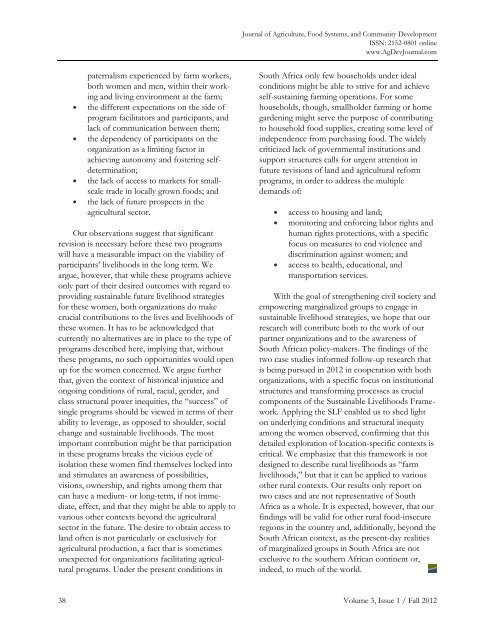Journal of Agriculture, Food Systems, and Community Development
Journal of Agriculture, Food Systems, and Community Development
Journal of Agriculture, Food Systems, and Community Development
You also want an ePaper? Increase the reach of your titles
YUMPU automatically turns print PDFs into web optimized ePapers that Google loves.
<strong>Journal</strong> <strong>of</strong> <strong>Agriculture</strong>, <strong>Food</strong> <strong>Systems</strong>, <strong>and</strong> <strong>Community</strong> <strong>Development</strong><br />
ISSN: 2152-0801 online<br />
www.AgDev<strong>Journal</strong>.com<br />
paternalism experienced by farm workers,<br />
both women <strong>and</strong> men, within their working<br />
<strong>and</strong> living environment at the farm;<br />
• the different expectations on the side <strong>of</strong><br />
program facilitators <strong>and</strong> participants, <strong>and</strong><br />
lack <strong>of</strong> communication between them;<br />
• the dependency <strong>of</strong> participants on the<br />
organization as a limiting factor in<br />
achieving autonomy <strong>and</strong> fostering selfdetermination;<br />
• the lack <strong>of</strong> access to markets for smallscale<br />
trade in locally grown foods; <strong>and</strong><br />
• the lack <strong>of</strong> future prospects in the<br />
agricultural sector.<br />
Our observations suggest that significant<br />
revision is necessary before these two programs<br />
will have a measurable impact on the viability <strong>of</strong><br />
participants’ livelihoods in the long term. We<br />
argue, however, that while these programs achieve<br />
only part <strong>of</strong> their desired outcomes with regard to<br />
providing sustainable future livelihood strategies<br />
for these women, both organizations do make<br />
crucial contributions to the lives <strong>and</strong> livelihoods <strong>of</strong><br />
these women. It has to be acknowledged that<br />
currently no alternatives are in place to the type <strong>of</strong><br />
programs described here, implying that, without<br />
these programs, no such opportunities would open<br />
up for the women concerned. We argue further<br />
that, given the context <strong>of</strong> historical injustice <strong>and</strong><br />
ongoing conditions <strong>of</strong> rural, racial, gender, <strong>and</strong><br />
class structural power inequities, the “success” <strong>of</strong><br />
single programs should be viewed in terms <strong>of</strong> their<br />
ability to leverage, as opposed to shoulder, social<br />
change <strong>and</strong> sustainable livelihoods. The most<br />
important contribution might be that participation<br />
in these programs breaks the vicious cycle <strong>of</strong><br />
isolation these women find themselves locked into<br />
<strong>and</strong> stimulates an awareness <strong>of</strong> possibilities,<br />
visions, ownership, <strong>and</strong> rights among them that<br />
can have a medium- or long-term, if not immediate,<br />
effect, <strong>and</strong> that they might be able to apply to<br />
various other contexts beyond the agricultural<br />
sector in the future. The desire to obtain access to<br />
l<strong>and</strong> <strong>of</strong>ten is not particularly or exclusively for<br />
agricultural production, a fact that is sometimes<br />
unexpected for organizations facilitating agricultural<br />
programs. Under the present conditions in<br />
South Africa only few households under ideal<br />
conditions might be able to strive for <strong>and</strong> achieve<br />
self-sustaining farming operations. For some<br />
households, though, smallholder farming or home<br />
gardening might serve the purpose <strong>of</strong> contributing<br />
to household food supplies, creating some level <strong>of</strong><br />
independence from purchasing food. The widely<br />
criticized lack <strong>of</strong> governmental institutions <strong>and</strong><br />
support structures calls for urgent attention in<br />
future revisions <strong>of</strong> l<strong>and</strong> <strong>and</strong> agricultural reform<br />
programs, in order to address the multiple<br />
dem<strong>and</strong>s <strong>of</strong>:<br />
• access to housing <strong>and</strong> l<strong>and</strong>;<br />
• monitoring <strong>and</strong> enforcing labor rights <strong>and</strong><br />
human rights protections, with a specific<br />
focus on measures to end violence <strong>and</strong><br />
discrimination against women; <strong>and</strong><br />
• access to health, educational, <strong>and</strong><br />
transportation services.<br />
With the goal <strong>of</strong> strengthening civil society <strong>and</strong><br />
empowering marginalized groups to engage in<br />
sustainable livelihood strategies, we hope that our<br />
research will contribute both to the work <strong>of</strong> our<br />
partner organizations <strong>and</strong> to the awareness <strong>of</strong><br />
South African policy-makers. The findings <strong>of</strong> the<br />
two case studies informed follow-up research that<br />
is being pursued in 2012 in cooperation with both<br />
organizations, with a specific focus on institutional<br />
structures <strong>and</strong> transforming processes as crucial<br />
components <strong>of</strong> the Sustainable Livelihoods Framework.<br />
Applying the SLF enabled us to shed light<br />
on underlying conditions <strong>and</strong> structural inequity<br />
among the women observed, confirming that this<br />
detailed exploration <strong>of</strong> location-specific contexts is<br />
critical. We emphasize that this framework is not<br />
designed to describe rural livelihoods as “farm<br />
livelihoods,” but that it can be applied to various<br />
other rural contexts. Our results only report on<br />
two cases <strong>and</strong> are not representative <strong>of</strong> South<br />
Africa as a whole. It is expected, however, that our<br />
findings will be valid for other rural food-insecure<br />
regions in the country <strong>and</strong>, additionally, beyond the<br />
South African context, as the present-day realities<br />
<strong>of</strong> marginalized groups in South Africa are not<br />
exclusive to the southern African continent or,<br />
indeed, to much <strong>of</strong> the world.<br />
38 Volume 3, Issue 1 / Fall 2012






